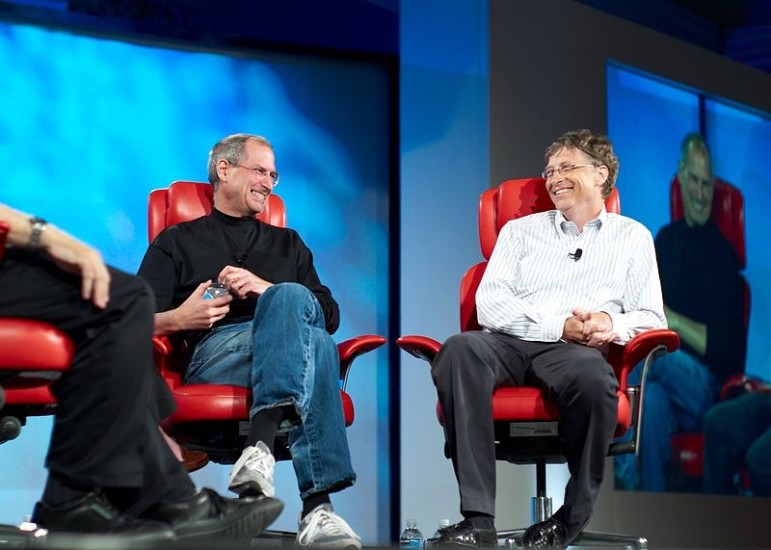
April 17, 2016: The Guardian
Last week, NPQ ran a now-much-read article by Joanne Barkan, entitled “Charitable Plutocracy: Bill Gates, Washington State, and the Nuisance of Democracy.” But, her take on the potential dangers in current billionaire philanthropy does not stand alone. Voices of caution are being raised in any number of venues, including here in the Guardian by Nellie Bowles.
What the tech titans have in common with the Gilded Age barons is a rapacious appetite for domination and, as they age, a complicated relationship with almost 100 percent of the world’s population. And there the comparisons end.
When Mark Zuckerberg chats up the president of China (in Mandarin), lobbies for immigration reform, or announces that he’s going to use his new LLC to rethink society, he is, according to this article in the Guardian, wielding a kind of influence that would make Rockefeller and Carnegie blush. As David Nasaw, a history professor at City University of New York and a Carnegie biographer, says:
Carnegie could never have imagined the kind of power Zuckerberg has. […] Politics today is less relevant than it has ever been in our entire history. These CEOs are more powerful than they’ve ever been. The driving force of social change today is no longer government at all.
Facebook, Google, and Amazon are vacuuming up your private information; they know where you are, and they more or less know what you are thinking. A recent court ruling intended to regulate Google instead “put the company at the forefront of Europe’s enforcement of Internet privacy.” Google owns 90 percent of the search market in Europe. Can government rein the tech titans in like they did Carnegie and Rockefeller?
As Peter Thiel, PayPal’s founder, wrote in “Zero to One, or How to Build the Future,” “All failed companies are the same: they failed to escape competition.” In his essay “The Education of a Libertarian,” he writes, “We are in a deadly race between politics and technology.” Thiel makes the case that the fate of the world depends on propagating the “machinery of freedom that makes the world safe for capitalism.”
In their radical faith in technological advances, politics and policymakers slow down progress. Had Uber scaled just a little bit slower, regulators would have had the opportunity to enforce the countless laws it broke. Tech is global; laws are local, and tech is faster and speeding up. Tech optimism is their redemption.
In the manifesto to which Silicon Valley adheres, tech titans alone can solve the world’s problems, from aging to space travel. From the article:
This week, Parker, known as the bad boy founder of the music filesharing service Napster and first president of Facebook, announced a $250m gift to six nationwide cancer centers. Tech founders have been criticized for not giving enough to charity, and this gift shows Parker seeking to establish himself in the pantheon of power players, according to historians.
Announcing it, Parker spoke about fixing the healthcare system to look more like the venture-funded, high-risk world of startups. “The system is broken somehow—funding doesn’t reward risk-taking. We don’t get ambitious science…we get incremental science.”
Sign up for our free newsletters
Subscribe to NPQ's newsletters to have our top stories delivered directly to your inbox.
By signing up, you agree to our privacy policy and terms of use, and to receive messages from NPQ and our partners.
Robots are already here. Tesla claims you could summon their driverless cars from across town or from across the country if only antiquated laws would permit it.
At Singularity University, participants are taught how to create companies that reach at least a billion people. SU students are challenged to influence all humanity. (The word “singularity” describes that moment in the not-too-distant future when mutually accelerating technologies suddenly make possible everything imagined in science fiction novels.)
The robber barons started with innovations, but their real genius lay in their ability to crush the competition. The tech titans have zealously updated the idea. Only a few hundred people are driving today’s transformations, more Alexander the Great than mere CEO. Unlike their predecessors, their aim is not to capture just one economic sector, but all of them. They are ideologues with an agenda.
The “robber barons” faced mass strikes, contended with anti-monopoly legislation and, eventually, the New Deal. The tech titans and their relatively small well-paid workforces are contented, and consumers love their toys.
Congress pushed back even when Carnegie and Rockefeller established their philanthropies. Not only were the Rockefellers and Carnegies significantly richer than today’s tech titans in inflation-adjusted dollars, but they also existed in an age when government represented less than three percent of the overall economy in the United States.
The “robber barons” of the late 19th century, however, presided over a period of economic growth unprecedented in U.S. history. They created the path and the means for what later became known as the American middle class. The tech sector destroys more jobs than it creates.
The tech titans are hedging their bets. Unlike their Gilded Age peers, we have Musk’s SpaceX and Bezos’s Blue Origin, Richard Branson’s Virgin Galactic and Microsoft co-founder Paul Allen’s Stratolaunch Systems. They are creating a way for the human species (at least the billionaire class) to endure by populating other planets, particularly Mars. Meanwhile, such initiatives as the Seasteading Institute are planning floating cities on artificial islands that can serve as tech nations in international waters.
With the launch of Open AI, at least Musk displays the humility to admit artificial intelligence poses the “biggest existential threat to mankind.”
Yes, government is antiquated, as this recent NYT article describes:
Until very recently, West Wing aides were stuck in a sad and stunning state of technological inferiority: desktop computers from the last decade, black-and-white printers that could not do double-sided copies, aging BlackBerries (no iPhones), weak wireless Internet and desktop phones so old that few staff members knew how to program the speed-dial buttons. On Air Force One, administration officials sent emails over an air-to-ground Internet connection that was often no better than dial-up modems from the mid-1990s.
We must begin to ask ourselves questions about the society that we want for our futures. Is there a countermovement that is necessary and needs our attention? And what would it entail? Your thoughts, please.—James Schaffer













